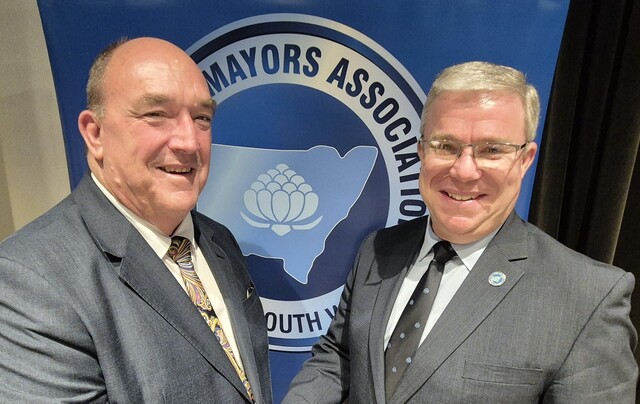The interim report from the Federal Parliament’s inquiry into local government sustainability highlights the urgent need for increased funding to Australia’s 537 local governments according to the peak body.
ALGA President Mayor Matt Burnett said the report confirmed councils are at a breaking point, after years of being asked to do more with less.
“Services and infrastructure that were once the responsibility of state and federal governments are now increasingly being delivered by local government,” Mayor Burnett said.
“We are also stepping up to provide vital local services – including healthcare, childcare and aged care – where it’s not commercially viable for the private sector.
“Building infrastructure for new housing, adapting to a changing climate and mitigating against natural disasters are national priorities being held back by a lack of funding and support for councils.
Mayor Burnett said the current funding model for local government is broken and needs to be fixed.
“We look forward to the final report and recommendations, and it’s absolutely crucial the inquiry recommends more support for Australian councils – not just re-cutting the limited and insufficient funding that’s currently provided.
“Competitive grant funding programs disadvantage smaller regional, rural and remote councils, so heading into this year’s election we are calling for new formula-based funding programs that would support all councils to deliver local solutions to national priorities.”
This would include:
• $1.1 billion per year for enabling infrastructure to unlock housing supply,
• $500 million per year for community infrastructure,
• $600 million per year for safer local roads,
• $900 million per year for increased local government emergency management capability and capacity, and
• $400 million per year for climate adaptation.
“A strong, sustainable local government sector is critical not just for our local communities, but also for the health and productivity of our nation.”
The federal parliamentary committee inquiry under took extensive consultation with stakeholders including local governments, councils and shires.
The inquiry received more than 280 submissions and held 16 public hearings in regional areas.
The House of Representatives Standing Committee on Regional Development, Infrastructure and Transport has today presented its interim report for the inquiry into local government sustainability.
The vast majority of local governments that made submissions to this inquiry and participated in public hearings spoke about how their role has evolved significantly from administering roads, rates and rubbish to navigating complex regulatory environments, managing limited financial resources, and addressing diverse and sometimes competing community needs and expectations. The interim report makes no formal policy recommendations to government but highlights these emerging themes.
Chair of the Committee, Mr Luke Gosling OAM, MP, said ‘local governments around Australia are increasingly being called upon to provide healthcare services and housing, manage ageing infrastructure and assets, and respond to current and future climate adaptation needs. These additional responsibilities are placing a significant financial strain on local governments who are struggling to meet community expectations.’
“The Committee is thoroughly reviewing the substantial evidence it has received to date and carefully considering the numerous and varied recommendations put forward in the submissions aimed at improving the sustainability of local governments. The Committee is looking forward to announcing its final recommendations in due course,” Mr Gosling said.
Further information about the inquiry, including published submissions, public hearing transcripts and an interim report are available on the inquiry webpage.
Meanwhile the report has sparked hope for the NSW Country Mayors Association.
“Rural and regional Councils in NSW have been doing increasingly more, while costs escalate and funding shrinks,” Country Mayors Association Chairman Rick Firman OAM said.
“The extent of these widespread trends have threatened the financial sustainability of our members and in some cases, rendered them all but insolvent.
“We now have hope that the Australian Government understands the gravity of the situation and that positive change might be on the horizon,”
The Country Mayors’ new optimism was triggered by the release of the ‘Interim Australian Government Report into Local Government Sustainability’.
The Interim Report has resulted from an Inquiry by the House of Representatives Standing Committee on Regional Development, Infrastructure and Transport, which received 287 submissions nationally.
“Our CMA submission was a 22-page litany of how our members struggle to meet the infrastructure and services expectations of their communities because of rising costs and falling revenue. Our CMA Deputy Chairman Mayor Russell Fitzpatrick gave evidence at a public hearing of the Inquiry.
The final Report from the Inquiry will have recommendations for the Australian Government but the Interim Report concludes with Committee Comments.
“The Interim Report documents that the plight of rural and regional Councils has been conveyed and heard, loud and clear. So, we have new hope that the Inquiry’s resultant final recommendations for improving financial sustainability in Local Government will include boosting Federal funding,” Mayor Firman said.
“Our CMA Board and Members are campaigning for the restoration of Federal Financial Assistance Grants to 1% of Australian taxation revenue and this could occur over a number years, like the erosion of the program did,” he said. “We need to hear from the Government and Opposition on their thoughts on this crucial issue of Financial Assistant Grants and the Interim Report more broadly.”
The grants are provided under the Local Government (Financial Assistance) Act 1995. The grant program delivered one per cent of the nation’s taxation revenue to communities through their Local Councils in the 1990’s and it has dwindled to half that, despite escalating operational costs and demands on Local Government, especially rural and regional councils.

















